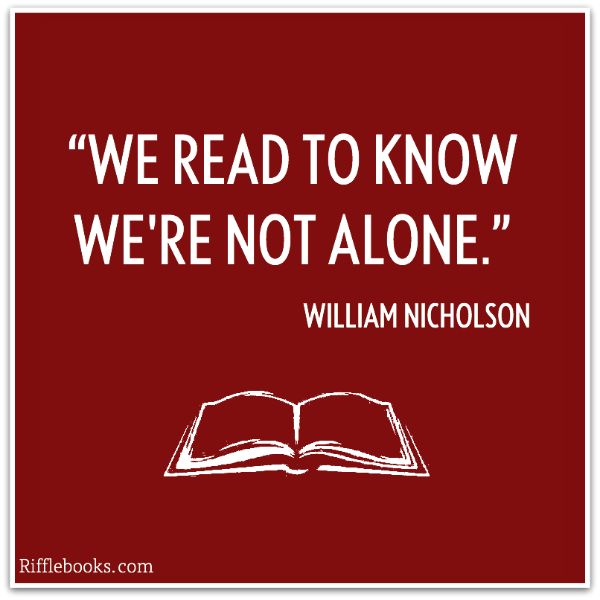In a guest post by Kate Hutchings, Community Manager at Riffle, she discusses whether reading books is a selfish activity.![]()
Does Reading Books Make You Selfish?
In an increasingly connected and demanding world, can we justify indulging ourselves by reading books?
If you’re a reader, you’ll be familiar with the feeling that you have countless real-world responsibilities, an overflowing to-do list, a job begging for your attention, and yet all you really want to do is sit down and read.
But in the fast-paced modern world it can often feel too indulgent to switch-off, unplug, and pick up that bestseller you keep hearing about, or that hidden gem you found at your local bookstore. Reading books—retreating from the world into wonderful, indulgent solitude—has become such a luxury, that sitting down with your feet up, cozying up to a book, and ignoring others’ demands on you can actually make you feel guilty. Or perhaps another word floats into your head—perhaps you even feel… selfish.
But, thankfully for those of us who just can’t resist the pull of those pages, recent studies suggest that indulging in a good book isn’t a selfish activity, and that, in fact, reading books can make you more selfless. Reading books may actually increase compassion, allowing you and everyone in your life to reap the benefits.
Recent studies suggest that indulging in a good book isn’t a selfish activity, and that, in fact, reading books can make you more selfless.
So what’s the science behind this? Psychologists at York University in Canada and at the University of Toronto published studies in 2006 and 2009 which found that people who regularly read fiction, and who become “absorbed in a story” are better able to empathize with others. These results were true even after accounting for gender differences, an individual’s openness, and the possibility that more empathetic people may choose to read more fiction.
A 2010 study came to a similar conclusion for young readers: children who had more stories read to them developed a keener “theory of mind,” which is the ability to attribute beliefs, intents, and desires to another, and to understand that these can be different from one’s own.
Of course, readers and writers have beaten science by a few decades (if not centuries?) in suspecting this: Joyce Carol Oates puts the selfless benefits of reading books beautifully when she calls it, “the sole means by which we slip, involuntarily, often helplessly, into another’s skin, another’s voice, another’s soul.” What better endorsement for the compassion gained from reading books?
“Reading is the sole means by which we slip, involuntarily, often helplessly, into another’s skin, another’s voice, another’s soul.” — Joyce Carol Oates
Further encouragement to switch off and pick up a novel comes when we understand that not all reading positively affects compassion. Recent research has demonstrated that the shallow reading we do when we skim an article—“de-coding”—is distinct from the deeper, immersive reading we experience with a novel. Again, readers and writers were ahead in suspecting this: literary critic Frank Kermode rather hilariously labelled these two styles of reading “spiritual reading” and “carnal reading.” If Kermode were still alive, he might summarize that we are increasingly consuming the Big Mac of online content rather than feeding our souls with the ambrosia of Dickens.
But joking aside, this research has shown that the benefits of selflessness do not extend to the less engaged, click-through-from-my-Facebook-feed style of reading. And it follows that a literary diet of web content and magazine articles may not only be detrimental to an individual’s social awareness: as we read and connect more than ever in the virtual world, might we actually be understanding each other less as a society?
While reading books may appear to be time we’re allocating to ourselves — a selfish turning inward away from the demands of others — the scientifically-backed benefits reveal that it is instead time spent immersed in and learning about the mind-scapes of other people — the writers themselves, their characters, and even humanity in general. To read is to socially connect on a deeper level; as British author William Nicholson has said: “We read to know we’re not alone.”

As the season of giving approaches, author Eugene H. Peterson reminds us that “Reading is an immense gift, but only if the words are assimilated, taken into the soul — eaten, chewed, gnawed, received in unhurried delight.” Reading books is a gift that we should of course give to others, but this year we can also feel reassured (or, dare I say, smug?) that we have a good reason to also give ourselves the gift of unhurried time to read. No longer will bookworms across the world feel embarrassed or guilty when someone says, “seriously, you’re reading books again?” Instead, we can confidently respond with the science of our selflessness on our side.
Kate Minckler (@bookyogi) for Rifflebooks (@Riffle)
Riffle is a community of book lovers. Join us!
Does Reading Books Make You Selfish? – Please RT – https://t.co/zlnohRfJXt via @Marquina
— Marquina (@Marquina) December 15, 2015
Leave a Reply